Differences And Applications Of PVC,PU, And RB Work Boots Materials

The material of boots directly affects their performance, comfort, and lifespan. Common shoe materials include PVC (polyvinyl chloride), PU (polyurethane), and RB (rubber). This article will detail the characteristics and application scenarios of these three materials, helping you choose the right work boots more effectively.
PVC (Polyvinyl Chloride)
Characteristics:
PVC is a synthetic plastic with good plasticity and chemical resistance. It exhibits excellent waterproof properties but is less flexible and elastic compared to other materials. PVC tends to be harder and less comfortable than PU and rubber.

● Affordable: PVC is a lower-cost option, making it an economical choice.
● Waterproof: PVC boasts excellent waterproof properties, making it suitable for crafting rain boots and other waterproof footwear.
● Easy to Clean: Its smooth surface makes PVC easy to clean and maintain.
● Good Chemical Resistance: PVC offers good resistance to various chemicals, making it suitable for specific work environments.
● Lower Comfort: Due to its reduced flexibility and elasticity, PVC may be uncomfortable for long-term wear.
● Moderate Durability: PVC's wear resistance is not as robust as PU and rubber, resulting in a shorter lifespan.
● Environmental Impact: The production process of PVC may generate harmful substances, rendering it less environmentally friendly.
Application Scenarios:
PVC is suitable for making rain boots, beach shoes, and some low-end casual footwear. It is primarily intended for short-term wear or specific environments.
PU (Polyurethane)
Characteristics:
PU is a synthetic material with a similar appearance and feel to genuine leather. It is lightweight and possesses good flexibility and elasticity. Additionally, PU exhibits good breathability and certain waterproof properties.

● Light and Comfortable: PU material shoes are lightweight and comfortable, reducing fatigue during prolonged wear.
● Softness: Its good flexibility and elasticity make PU shoes suitable for long-term wear.
● Durability: PU offers high wear resistance, making it suitable for daily wear and outdoor activities.
● Easy to Clean: With a smooth surface, PU is easy to clean and maintain.
Application Scenarios:
PU is suitable for making sports shoes, casual shoes, and some lightweight work shoes. It is ideal for daily wear and light outdoor activities.
RB (Rubber)
Characteristics:
Rubber is a natural or synthetic high-elasticity material known for its toughness and durability. It exhibits excellent elasticity and impact resistance, along with great slip resistance and wear resistance.

● Slip-resistant and Durable: Rubber offers excellent slip resistance and wear resistance, making it suitable for walking on slippery surfaces.
● Weather Resistance: Rubber demonstrates good adaptability to various weather conditions and is resistant to aging.
● Waterproof: With good waterproof properties, rubber is suitable for use in wet environments.
● Protective: Rubber is ideal for shoes requiring high protection, such as hiking boots and work shoes.
● Heavier: Rubber material is relatively heavy, which may feel burdensome when worn for long periods.
● Less Breathable: Rubber has poor breathability, potentially causing a stuffy feeling during prolonged wear.
Application Scenarios:
Rubber is suitable for making work shoes, hiking boots, rain boots, and other footwear requiring high wear resistance and slip resistance.

Polyvinyl Chloride (PVC), Polyurethane (PU), and Rubber (RB) each offer distinct advantages, disadvantages, and application scenarios. PVC is economical, PU is lightweight and comfortable, and Rubber is durable and slip-resistant.
For temporary or part-time workers not requiring expensive waterproof boots for extended periods, PVC boots are an affordable, waterproof option.
For those needing long-term wear, especially workers with plantar fasciitis or diabetes, PU is recommended despite its lower chemical and heat resistance. PU's resistance to acids, along with its temperature range of -40 to 160 , accommodates most work environments.
While Rubber excels in slip resistance and durability, it's less ideal for boot uppers due to weight and breathability concerns. However, it's excellent for outsoles. Many wellington work boots now combine materials. For those prioritizing price, PVC uppers with Rubber outsoles suffice. For comfort, PU uppers with Rubber outsoles, and a PU midsole, are recommended, enhancing comfort and reducing fatigue.
Choosing the right material enhances usability and performance. I hope this guide helps you select the ideal work boots for your needs.


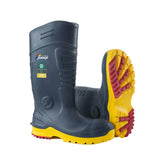

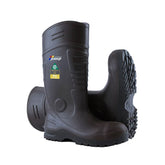

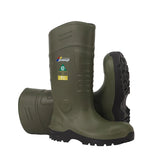

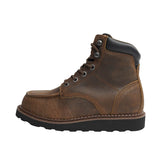
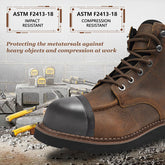
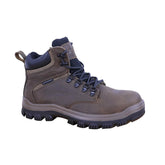
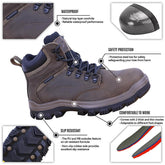
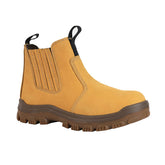
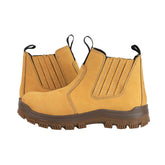








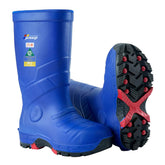

Leave a comment
Please note, comments need to be approved before they are published.